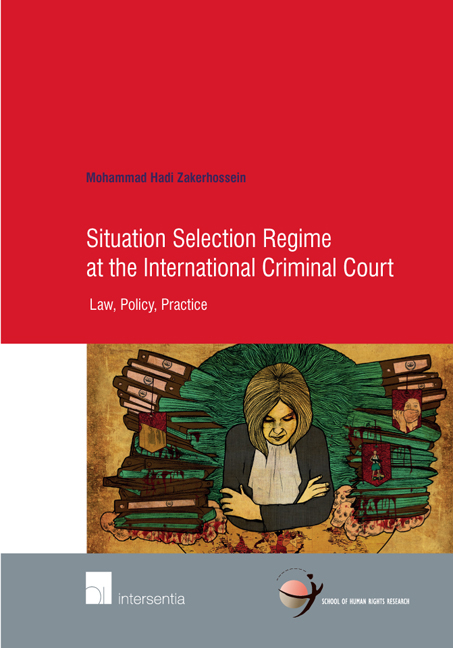Book contents
- Frontmatter
- Contents
- Acknowledgment
- Abbreviations
- General Introduction
- Part One Formulating the Concept of Situation in the Rome Statute Sense
- Part two Situation Selection Process
- Chapter I Trigger Mechanism
- Chapter II Identification Stage
- Chapter III Preliminary Examination
- Chapter IV Making a Decision on the Situation Selection
- Part three Situation Selection Criteria
- Part Four Situation Selection In Light Of Expressivism
- Conclusion
- Bibliography
- ICC Case Tables
- OTP Documents
- About the Author
- School of Human Rights Research Series
Chapter I - Trigger Mechanism
from Part two - Situation Selection Process
Published online by Cambridge University Press: 13 October 2018
- Frontmatter
- Contents
- Acknowledgment
- Abbreviations
- General Introduction
- Part One Formulating the Concept of Situation in the Rome Statute Sense
- Part two Situation Selection Process
- Chapter I Trigger Mechanism
- Chapter II Identification Stage
- Chapter III Preliminary Examination
- Chapter IV Making a Decision on the Situation Selection
- Part three Situation Selection Criteria
- Part Four Situation Selection In Light Of Expressivism
- Conclusion
- Bibliography
- ICC Case Tables
- OTP Documents
- About the Author
- School of Human Rights Research Series
Summary
The jurisdiction of the ICC is dormant. The term ‘dormant jurisdiction’ was branded by Olásolo. He explains that the phenomenon of dormant jurisdiction arises from the fact that the Court has been given jurisdiction by its States Parties through the Rome Statute. The Court operates based on the theory of ‘delegated jurisdiction’. It means that States Parties transfer to the ICC their own territorial and personal jurisdictions over international crimes. As soon as a State joins the Court and ratifies its constituent document, it automatically accepts the jurisdiction of the Court. The consent of a State Party for the jurisdiction of the Court is expressed through ratification. In other words, the essence of State Party membership is that a State accepts the exercise of jurisdiction by the Court over any Article 5 crimes committed on its territory or by its nationals from the applicable date of entry into force of the Statute onwards. This approach is called ‘automatic jurisdiction’, which is at odds with the initial approach adopted by the 1994 draft Statute. The International Law Commission (ICL) Draft Statute had provided an opt-in or consent-oriented approach. According to the proposal, in every case, all the States affected would have to give their consent in order for the Court to be able to proceed. The opt-in proposal was designed to allow States maximum flexibility in accepting the ICC's jurisdiction, a flexibility that might help maximize the number of States Parties.
Nonetheless, that initial approach in the view of many meant ‘à la carte’ jurisdiction, which was hardly acceptable for the core crimes. If it was the case, the Court would become a tool in the hands of States. Such a result clearly contradicts the constituent objectives of the Court, namely ending impunity and the administration of an impartial justice. As some commentators on the Rome Statute assert, the opt-in and case-by-case consent proposals would have resulted in practical terms in a significantly weakened court. Taking into account these adverse effects, the founders of the Court decided to found an organization with automatic jurisdiction. It means that the Court has jurisdiction over all potential and would-be situations, but if it is going to be exercised over a specific situation, it should be initially awakened and alerted.
- Type
- Chapter
- Information
- Situation Selection Regime at the International Criminal CourtLaw, Policy, Practice, pp. 57 - 96Publisher: IntersentiaPrint publication year: 2017

